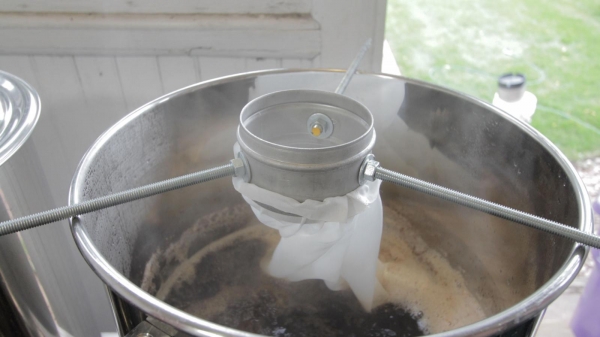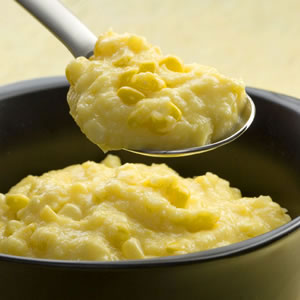Billy Broas
Member
- Joined
- Aug 6, 2014
- Messages
- 11
- Reaction score
- 0

"Ugh, you want me to add another 30 minutes to my brew day?!?"
I know...brewing takes a long time already. It eats up the better part of a day. So it's no surprise the thought of extending your boil from 60 minutes to 90 minutes makes you grumble.
But if you hear me out, I'm willing to bet you will at least consider extending your boil. You may even do it on your very next batch!
Shall we begin? Great.
In my last article I talked about ways to alter your beer without altering the ingredients. One of those ways was by boiling the wort for more time.
What I didn't mention there were the other benefits of a longer boil (we'll assume 90 minutes from here on).
Like this:
Drive off DMS
Some say DMS is a boogey man. That it's rare in homebrews. Yet it comes up over and over again in homebrew competitions that I judge. Especially when I get assigned the pilsners. Category 2A always has plenty of corn to go around!

Yes, DMS gives the beer a corny aroma. It's usually cooked corn, creamed corn, or cabbage-like in character. In my opinion it's one of the worst off-flavors there is. Diacetyl? Meh, don't mind it so much. Acetaldehyde? Not pleasant, but I can deal with it. But creamed corn? Yuck.
Brief description - DMS comes from another chemical called SMM. When SMM heats up (like in the mash and boil), DMS is produced. DMS gets driven off in the boil so most of the time it's not an issue, even in a 60 minute boil. The occasions you want to extend the boil are those where you're using very light malts, like pilsner malt. It contains more SMM because it's not kilned as highly as other malts.
There is little debate (relatively speaking, for homebrewing) around this topic: Using pilsner malt? Do a 90 minute boil.
Ok, so you buy that argument. When you use pilsner malt you'll do a 90 minute boil. However, that could lead you into another issue consistency.
Always doing a 90 minute boil gives you consistency
My logic in switching from 60 to 90 minute boils went like this: "I use pilsner malts pretty often. I want to be consistent in my process and use the same boil length every time. Therefore, I'll just do a 90 minute boil for every batch."
Consistency in batches and hitting your numbers is one of the toughest things in homebrewing. "I can't hit my target gravity" is a recurring question from my students that learn to brew all-grain.
My advice to them is summed up by this: "Learn your system. Take detailed notes. Be consistent."
It's tough to learn your brew system when you're changing up the boil length every few batches. Not to mention the risk of choosing the wrong equipment profile in BeerSmith. Scary thought!
To keep things simple I decided to do 90 minute boils across the board. There's very little downside and now that my brew days are almost identical process-wise, I've become much better at brewing consistent batches and hitting my numbers.
There are other reasons too.
Use the 30 minutes to "take care of business" before adding the hops.
I add the first hop additions at 60 minutes, so I like to think of the first 30 minutes as time to get things in shape before adding the hops. It's like that mad scramble to clean your house right before your first party guest arrives.
Here's an interesting take from a Bavarian Brewing Tech article:
"From practical point of view, boiling should not take less than 90 minutes. The specific length depends on the hop schedule. The minimum time is explained by the following. Sterilization requires about 5 minutes. An additional 10 minutes (total of 15 minutes) will kill the enzymes. Another 15 minutes are needed to eliminate tannin originating from malt husks. This first half hour, in case of infusion mash, is to decompose and precipitate some of the proteins. This should be accomplished before hops are added, because otherwise the sticky hop resins will combine with the coarse protein flocks and precipitate out of solution."
Now, I don't agree with all of that. For example you can sanitize while you boil the hops. But I do like giving the hot break time to subside before adding the hops.
Plus this is a good time for another key step - gravity adjustment. If your efficiency came in a little low you can use these 30 minutes to make an adjustment. Take a gravity reading, figure out how much DME to add and bingo! You're back on track, just in time for the guests (hops) to arrive.
Now to address your biggest concern - the added time to brew day. Well I think if you look hard at your process you'll find there is a lot to keep you busy in those 30 minutes. Examine those tasks you perform after the boil and see if you can actually do them during those 30 minutes.
Here are some ideas:
- Determine your efficiency and make any gravity adjustment, as mentioned above
- Record your notes
- Clean the mash tun
- Clean up your brewing area
- Put away equipment you're done with
- Get your wort chiller and fermentation gear ready
Do you already do a longer boil? Chime in down in the comments and let us know why you like it.
***
Billy Broas heads up The Homebrew Academy, where you can find tips, videos, and online courses for brewing world-class beer at home. He's co-author of the book Craft Beer for the Homebrewer, a certified BJCP beer judge, and his beer philosophy is that "we should all be beer geeks, not beer snobs."












![Craft A Brew - Safale S-04 Dry Yeast - Fermentis - English Ale Dry Yeast - For English and American Ales and Hard Apple Ciders - Ingredients for Home Brewing - Beer Making Supplies - [1 Pack]](https://m.media-amazon.com/images/I/41fVGNh6JfL._SL500_.jpg)














































